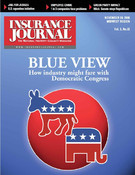Did Green Party cost Democrats control of Michigan Senate?
One of the main reasons Republicans were swept from power was the Iraq war. Ironically, it may have helped preserve their long-standing lock on the Michigan Senate, an Associated Press story said.
Republicans won the two closest Senate races in the Nov. 7 election by a combined 1,294 votes out of 210,000 cast, giving them a 21-17 majority instead of a 19-19 tie to be broken by Democratic Gov. Jennifer Granholm’s lieutenant governor. Both races had Green Party candidates who ran as part of the “Stop the War Slate.”
The insurance industry has battled Democratic Gov. Granholm and her administration on rating and credit scoring issues. A hearing on the legality of the use of credit scoring in setting insurance rates took place in October and it remains unclear just what impact, if any, the industry may have had on the outcome of the senate battle.
In Oakland County, peace activist Kyle McBee got 2.7 percent of the vote in a race Republican John Pappageorge won by 776 votes, or two-thirds of a percentage point. Another anti-war candidate, Lloyd Clarke, received 2.5 percent in a Saginaw-area district that Roger Kahn, a Republican, captured by 520 votes, or a half-percentage point.
Voters who went Green of course wouldn’t necessarily have voted Democratic and may have backed the GOP, or skipped voting in their local Senate race or not shown up at the polls at all.
Even so, the outcome was especially frustrating for Democrat Andy Levin, who lost to Pappageorge, a former state representative.
Levin said he welcomes the participation of minor-party candidates in elections but only if they truly run a campaign. He said McBee, whom he never met, didn’t come to any candidate forums.
Levin said McBee’s own roommate ended up volunteering for the Levin campaign because McBee “wasn’t doing anything.”
“It wasn’t even a campaign. It wasn’t a real party or individual effort,” said Levin, son of U.S. Rep. Sander Levin and nephew of U.S. Sen. Carl Levin. “I wouldn’t want to take away having a lot of parties jostling in elections. But it would be nice if you had real efforts.”
Clarke, who spent two months dropping campaign door hangers at 6,000 homes in Saginaw and Gratiot counties, expressed a concern of many minor-party candidates: not having full access to the political process.
“I was locked out of every public gathering,” he said.
David Sole, a Green Party candidate who ran for U.S. Senate, said his party could collect a much higher portion of the vote if given more access to debates and media. He said Democrats should stop complaining.
In the Saginaw-area race, Clarke said he probably would have voted for the Democratic candidate, Carl Williams, if he hadn’t run. He noted that many of his pro-peace friends, once likely supporters, voted for Williams because they feared helping Kahn and the Republicans.
“The votes I got are my votes,” said Clarke, who hoped for 1,000 votes but got more than 2,300.”They’re not Kahn’s or Williams’. They’re mine.”
The Green Party’s influence on the Senate districts didn’t go unnoticed by the GOP, but Republicans said they also deserved credit for withstanding a fierce Democratic push to win control of the Senate.
Democrats took back power in the state House for the first time in eight years, 58-52, along with easy re-election victories for Granholm and Democratic U.S. Sen. Debbie Stabenow.
Democrats haven’t controlled the Senate since 1984, when two Democratic senators were recalled after voting for an income tax increase.
Copyright 2006 Associated Press. All rights reserved. This material may not be published, broadcast, rewritten or redistributed.
Was this article valuable?
Here are more articles you may enjoy.


 How One Fla. Insurance Agent Allegedly Used Another’s License to Swipe Commissions
How One Fla. Insurance Agent Allegedly Used Another’s License to Swipe Commissions  Insurance Issue Leaves Some Players Off World Baseball Classic Rosters
Insurance Issue Leaves Some Players Off World Baseball Classic Rosters  US Appeals Court Rejects Challenge to Trump’s Efforts to Ban DEI
US Appeals Court Rejects Challenge to Trump’s Efforts to Ban DEI  Q4 Global Commercial Insurance Rates Drop 4%, in 6th Quarterly Decline: Marsh
Q4 Global Commercial Insurance Rates Drop 4%, in 6th Quarterly Decline: Marsh 


